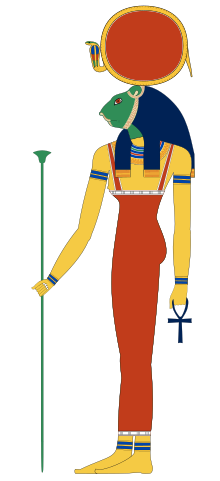Sakhmet
| Sekhmet | |||||
|---|---|---|---|---|---|
| Goddess of fire, war, fertility and healing | |||||

Sekhmet with head of lioness and a solar disk/sun disk and uraeus on her head
|
|||||
| Name in hieroglyphs |
|
||||
| Major cult center | Memphis, Leontopolis | ||||
| Symbol | Sun disk, red linen, lioness | ||||
| Personal Information | |||||
| Consort | Ptah | ||||
| Offspring | Nefertem | ||||
| Parents | Hut-Heru and Ra or Heru Sa-Aset | ||||
| Siblings | Bastet, Maat, Khonsu, Shu and Tefnut | ||||
In Egyptian mythology, Sekhmet (/ˈsɛkˌmɛt/ or Sachmis (/ˈsækmᵻs/; also spelled Sakhmet, Sekhet, or Sakhet, among other spellings, means "the powerful one") is a warrior goddess as well as goddess of healing. She is depicted as a lioness, the fiercest hunter known to the Egyptians. It was said that her breath formed the desert. She was seen as the protector of the pharaohs and led them in warfare.
Her cult was so dominant in the culture that when the first pharaoh of the twelfth dynasty, Amenemhat I, moved the capital of Egypt to Itjtawy, the centre for her cult was moved as well. Religion, the royal lineage, and the authority to govern were intrinsically interwoven in ancient Egypt during its approximately three millennia of existence.
Sekhmet also is a Solar deity, sometimes called the daughter of the sun god Ra and often associated with the goddesses Hathor and Bast. She bears the Solar disk and the uraeus which associates her with Wadjet and royalty. With these associations she can be construed as being a divine arbiter of the goddess Ma'at (Justice, or Order) in the Judgment Hall of Osiris, associating her with the Wadjet (later the Eye of Ra), and connecting her with Tefnut as well.
...
Wikipedia
